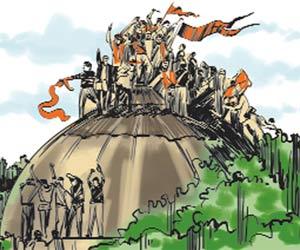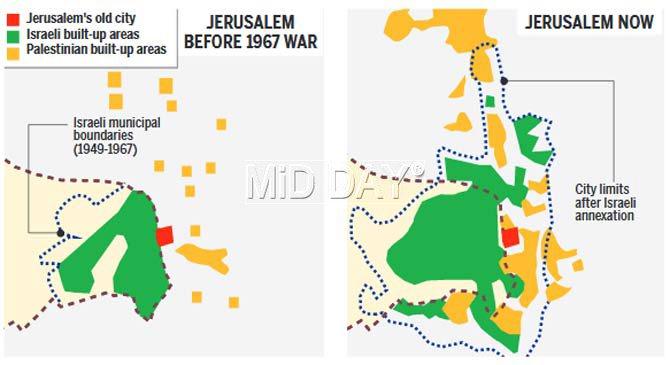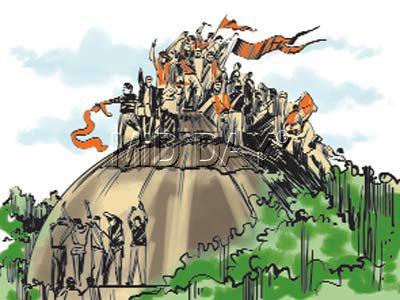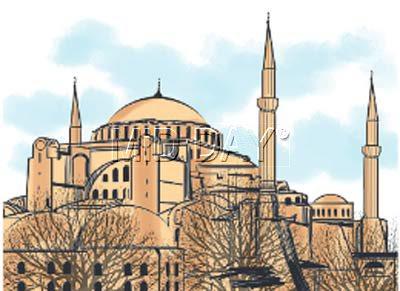Religious supremacy has always been a matter of dispute, leading to issues that still remain incomprehensible. Various religious groups have been claiming their rights over something or the other and trying to establish their beliefs since time immem

Religious supremacy has always been a matter of dispute, leading to issues that still remain incomprehensible. Various religious groups have been claiming their rights over something or the other and trying to establish their beliefs since time immemorial. From Trump's recognition of Jerusalem as the capital of Israel, and the protests that have erupted in the Middle-East following the decision; to the Supreme Court's decision to have the final hearing in the Ayodhya dispute on February 8, 2018, going against the appeals of minority groups to defer the proceedings further, take a look at how these issues have changed the world's geo-political strategies and driven people to religious extremism.
Jerusalem - The land of divisions

Text/ Rimita Majumder; Illustration/ Ravi Jadhav
Divide and rule
1882CE: The British conquer Egypt. After Alexander II's assassination, Russian Jews are attacked. Many move to Palestine, others settle in Jerusalem.
1914: World War I breaks out. As Turks perpetrate genocide against Ottoman Empire Armenians, over a million people are killed. Some refugees go to Jerusalem.
1937: Peel committee recommends partition of the country between Arabs and Jews and Jerusalem to be left under the British Mandate's control.
1948: A day before the British Mandate is terminated, Jews proclaim Declaration of Independence, following which the state of Israel is formed.
1993: Israel and PLO sign a peace process, Oslo Accords.
Current situation
For the past 70 years, the Israeli-Palestinian conflict has affected the Middle East and prevented peace-building efforts. Every US President has recognised that the step to relocate the embassy from Tel Aviv to Jerusalem would have serious repercussions. However, US President Donald Trump on Wednesday finally recognised Jerusalem as the capital of Israel, and said the process of moving the embassy would start soon.
1992
Bill Clinton supports recognising Jerusalem as Israel's capital
2000
During the election campaign, George W Bush promises to move the embassy
'If half the funds spent by some rulers in the region to encourage terrorism, extremism, sectarianism and incitement against neighbours were spent on liberating Palestine, we wouldn't be facing this American egotism today'
Javad Zarif, Iran's foreign minister
'Mr Trump, Jerusalem is the red line of Muslims. It is a violation of international law to take a decision supporting Israel while Palestinian society's wounds are
still bleeding'
Recep Tayyip Erdogan, president of Turkey
Ayodhya - A land of conflicts

Unending dispute
1528: Babri Masjid built on a site that Hindus claim to be the spot where Lord Ram was born. Religious violence breaks out in 1853.
1859: The British colonial administration erects a fence to separate the places of worship of the Hindus and Muslims. Protest erupts after Hindus allegedly place idols inside the mosque, following which the government locks
up the place.
1986: The district judge orders the gates of the mosque to be opened and Hindus allowed to worship there.
1992: VHP, Shiv Sena and BJP supporters destroy the mosque, leading to nationwide rioting. Over 2,000 people get killed
2002: VHP confirms that it would begin construction of a temple on March 15. Hundreds of people converge at the site. At least 58 people get killed in an attack on a train in Godhra, carrying Hindu activists returning from Ayodhya.
Current situation
Unaffected by submissions that a Supreme Court verdict in the Ayodhya title dispute at the moment would lead to serious repercussions, a bench of the apex court fixed the date for the final hearing on February 8, 2018. Minority community members had requested the court to defer the hearing till after July 15, 2019. The appellant took different routes to build pressure for adjournment. They said that the dispute was the most important case in the history of India, which would 'decide the future of the polity'.
2010
In September, an Allahabad High Court bench gave a judgment fora three-way partition of the disputed site
2,000
Number of deaths in the 1992 Hindu-Muslim riots
'This matter has been pending in the SC for the last seven years. A decision in this case will have ramifications, which will go far beyond the four walls of the court. So what is the hurry? Let us get enough time to prepare arguments'
Kapil Sibal, Counsel for Muslim trust
'BJP demands that the case be heard as soon as possible. The Supreme Court should give a judgment, and a grand Ram temple should be built in Ayodhya'
Amit Shah, BJP chief
Hagia Sophia - Threatened secularism

Symbol of change
6th century CE: Hagia Sophia, a cathedral built at Constantinople (now Istanbul), under the direction of Justinian I.
532 AD: The building gets destroyed in the Nika Revolt. Under Justinian's orders, architects start rebuilding it.
1453: After winning over Constantinople, Sultan Mehmet orders it to be turned into a mosque.
1934: Turkish president ordains that the structure be turned into a museum.
Current situation
For years, the Hagia Sophia museum has been a symbol of Turkey's commitment towards a secular society. But, the tradition now faces the pressure of the calls to convert it back into a mosque. The idea has become appealing with President Recep Tayyip Erdogan promoting a prominent role for Islam in Turkey. Even today, the building's fate tugs at the hearts of Muslims and Christians.
06
No. of years taken to build Hagia Sophia
916
Number of years for which Hagia Sophia was a church
'For us, 1453 was a symbol of Islam winning over Christianity. Now, for those who want to keep the Hagia Sophia a museum, it's a symbol of secularism winning over Islam. But Turkey has changed, and they are out of touch with it'
Emrullah Celik, Islamic activist
Catch up on all the latest Mumbai, National and International news here
Download the new mid-day Android and iOS apps to get updates on all the latest and trending stories on the go
 Subscribe today by clicking the link and stay updated with the latest news!" Click here!
Subscribe today by clicking the link and stay updated with the latest news!" Click here!









